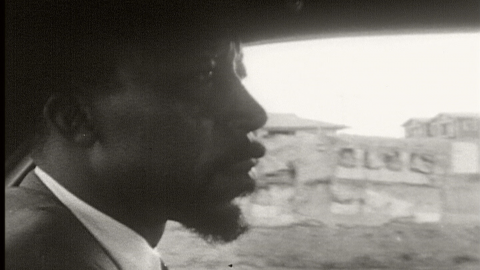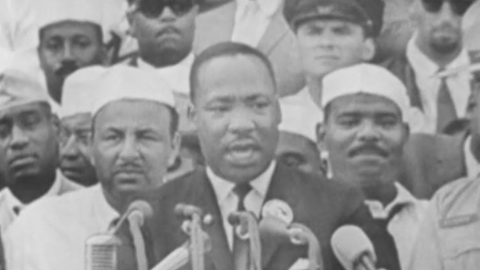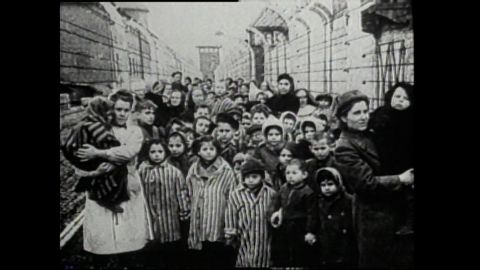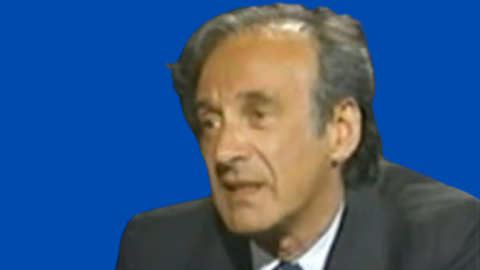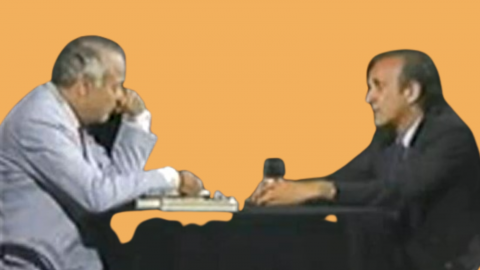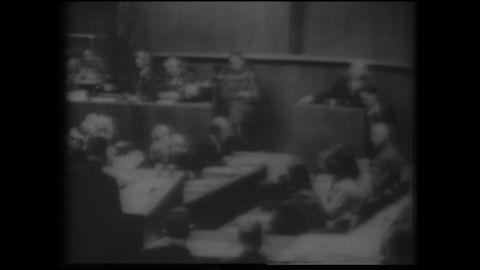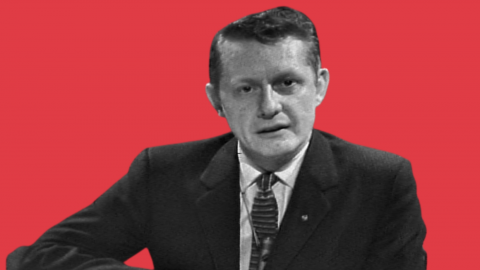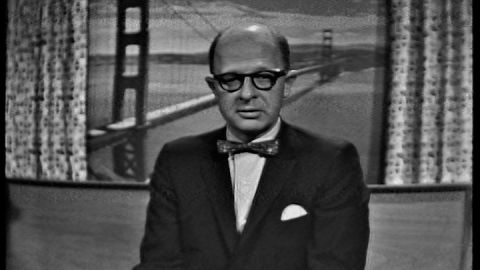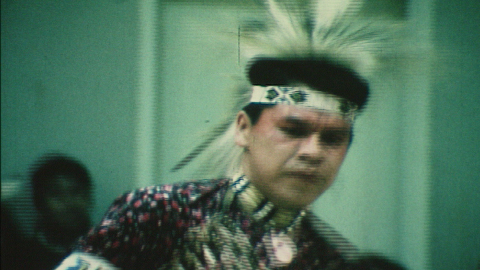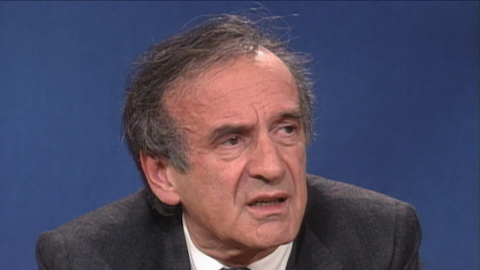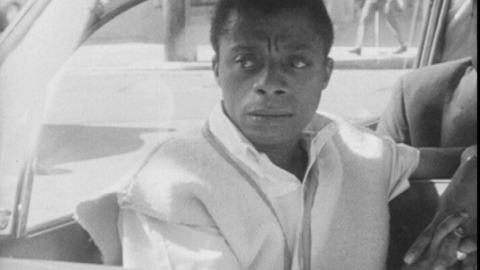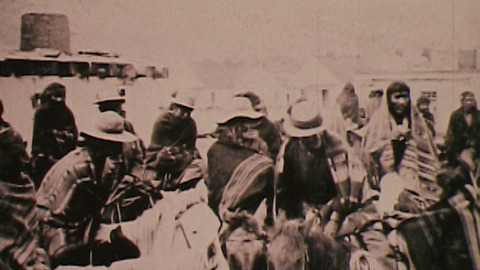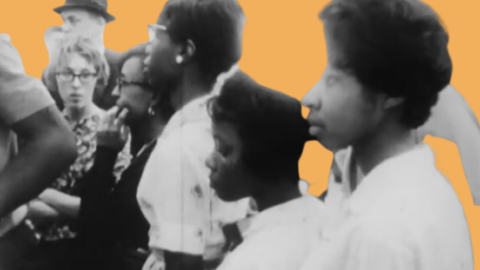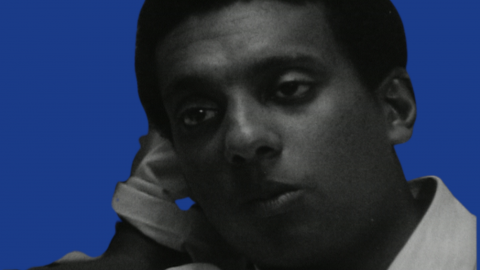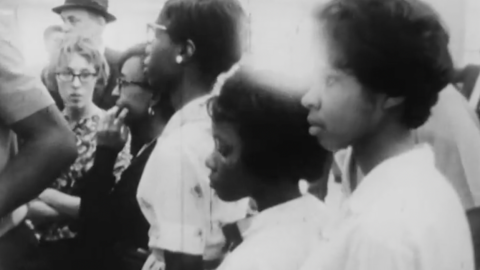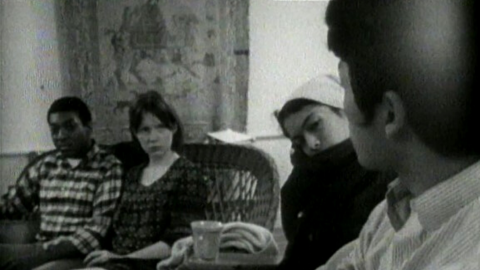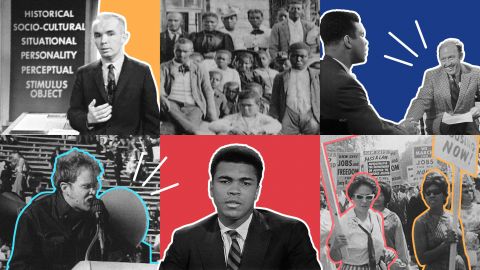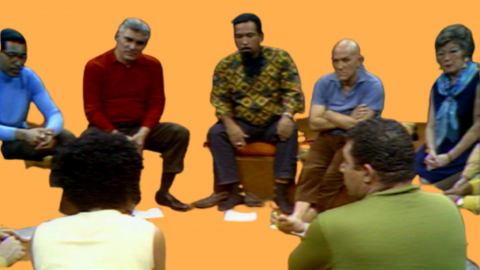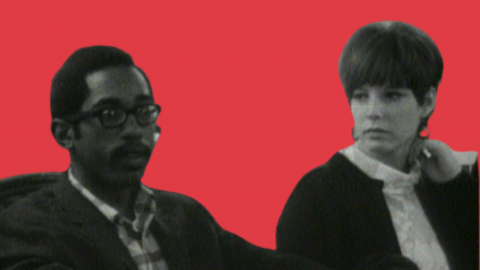- [Announcer] This is Perspectives
presented by National Educational Television.
- I think the one has got
to find some way
of putting the present administration
of this country on the spot.
One has got to force somehow from Washington
a moral commitment,
not to the Negro people,
but to the life of this country.
It doesn't matter any longer,
and I'm speaking for myself, for Jimmy Baldwin,
and I think I'm speaking
for a great many other Negroes, too.
It doesn't matter any longer what you do to me.
You can put me in jail,
you can kill me.
By the time I was 17,
you had done everything that you could do to me.
The problem now is, how are you gonna save yourselves?
- [Cop] Get on back, now!
[crowd talking]
- [Announcer] Doctor Kenneth Clark,
Professor of Psychology
at the City College of New York,
Director of Harlem Youth Opportunities Unlimited,
and Research Director
of the Northside Center for Child Development,
brings us an interpretation of
The Negro and the American Promise.
- The racial confrontation in America is now clear.
What is required of Negro leadership is equally clear,
namely thrust for full citizenship rights.
And now,
if responsible Negro leadership is battle-weary,
and not able to mobilize itself
to achieve and sustain meaningful and solid breakthroughs,
then the result will be chaos,
chaos, either in terms of social confusion and violence,
or what to me would be even worse, moral dry rot.
We've invited three men
on the forefront of the Negro struggle,
to sit down and talk with us
in front of the television camera.
Each of these men, through his actions and his words,
but with vastly different manner and means,
is a spokesman for some segment of the Negro people today.
The Reverend Martin Luther King
is a symbol of the heroic nonviolent struggle
for integration and full rights, now.
He works through peaceful direct action.
Malcolm X, the black Muslims' most eloquent spokesman,
is an apostle of black racism and racial segregation.
This movement appeals strongly
to the most alienated of Negroes.
We talked also with James Baldwin,
a writer, who through the magic of his words,
and the purity of his artistry and truth,
has communicated the full passion
of the Negroes' present insistence.
Martin Luther King, our first guest,
is a 34-year-old Atlanta-born Baptist minister,
who personifies the dignity,
the discipline, and the insistence
upon full rights of American citizenship,
which the present thrust of the Negro people demands.
- And we will not be fooled.
We will not allow anybody to tell us
that the lightning did this,
not the physical lightning from the sky, oh no,
we know what did it.
We know that it came as a result of some individuals,
who had not allowed the spirit of Jesus Christ
to pervade their lives.
We know that what happened here
came from somebody who had the strange illusion
that they could block the aspirations of the Negro people
for freedom and justice by destroying property.
And it is not just ordinary property,
all property is significant.
But this is a church of God.
And when men will do this,
when men will seek to destroy the church of God,
they have degenerated to a tragic level
of inhumanity and sin and evil.
This should make us go out with more determination.
This should cause us to go out
more determined than ever before
to achieve our rights.
So let us get rid of fear,
fear of going to jail.
[crowd murmuring]
Fear of going down to register and vote.
Fear of losing a job. [indistinct]
We get rid of that, nobody can stop us.
[gospel singing]
- [Kenneth] Martin Luther King is at once
a fearless activist,
a contemplative religious scholar,
and a social philosopher.
He's also a skilled politician, and an organization man.
We have taken this opportunity to ask him
about the relationship
between the direct action
nonviolent technique,
which he uses so effectively,
and his personal philosophy of love for the oppressor.
- [Martin] One is a method of action,
nonviolent direct action is a method of acting
to rectify a social situation that is unjust,
and it involves in engaging in a practical technique
that nullifies the use of violence
or calls for nonviolence at every point,
that is you don't use physical violence
against the opponent.
[gospel singing]
Now, the love ethic is another dimension,
which goes into the realm of accepting
nonviolence as a way of life.
There are many people who will accept nonviolence
as the most practical technique
to be used in a social situation,
but they would not go to the point of seeing
the necessity of accepting nonviolence as a way of life.
Now, I accept both.
I think that nonviolent resistance
is the most potent weapon available to oppressed people
in their struggle for freedom and human dignity.
It has a way of disarming the opponent,
it exposes his moral defenses, it weakens his morale,
and at the same time it works on his conscience.
He just doesn't know how to handle it.
And I've seen this over and over again
in our struggle in the South.
- We pray for thy presence now.
Come, oh Holy Spirit, - [Cop] Y'all move on.
- With all thy quickening power.
Impart unto us the courage that we need in this moment,
while we are children of thine,
and all we really want is to be treated
as human beings with dignity.
Come now oh God.
- Come now.
- Come now oh Holy Spirit.
Come now oh merciful Father.
Come now.
Amen.
- Please go to these pull wagons
that are parked in the street.
Get their names as you arrest them.
♪ I'm gonna let it shine ♪
♪ This little light of mine ♪
- [Martin] Now on the question of love or the love ethic,
I think this is so important,
because hate is injurious to the hater,
as well as the hated.
Many of the psychiatrists are telling us now
that many of the strange things
that happen in the sub-conscious
and many of the inner conflicts are rooted in hate.
And so they're now saying love or perish.
- [Kenneth] But is it not too much to expect
that a group of human beings
who've been the victims of cruelty,
flagrant injustice,
could actually love those
who've been associated with the perpetrators,
if not the actual perpetrators themselves?
How could you expect, for example,
the Negroes in Birmingham, who know Bull Connor,
to really love him in any meaningful sense?
- [Martin] Well I think one has to understand
the meaning of love at this point.
I'm certainly not speaking of an affectionate response.
I think it is really nonsense to urge oppressors,
I mean, oppressed people to love their oppressors
in an affectionate sense.
I find it pretty difficult to like people like Bull Connor.
I find it difficult to like Senator Eastland.
But I think you can love where you can't
like the person,
because like is an affectionate quality.
[crowd chanting]
♪ I'm gonna let it shine ♪
- [News Reporter] Doctor King how long
do you expect to stay in jail?
- I'm under orders to keep walking.
- Malcolm X, one of the most articulate exponents
of the black Muslim philosophy,
has said of your movement and your philosophy,
that it plays into the hands of the white oppressors,
that they are happy to hear you talk about
love for the oppressor, because this disarms the Negro
and fits into the stereotype of the Negro as a meek,
turning the other cheek, sort of creature.
Would you care to comment on Mister X's beliefs?
- Well, I don't think of love as,
in this context, as emotional bosh.
I don't think of it as a weak force,
but I I think of love as something strong,
and that organizes itself into powerful direct action.
This is what I've tried to teach
in the struggle in the South,
that we are not engaged in a struggle,
that means we sit down and do nothing.
That has a great deal of difference
between non-resistance to evil and nonviolent resistance.
Non-resistance leaves you in a state
of stagnant passivity and deadened complacency.
Where nonviolent resistance means that you do resist
in a very strong and determined manner.
And I think some of the criticisms of nonviolence,
or some of the critics, fail to realize
that we are talking about something very strong,
and they confuse non-resistance with nonviolent resistance.
- He goes beyond that in some of the things
I've heard him say,
and say that this is deliberately your philosophy
of love of the oppressor,
which he identifies completely,
with the nonviolent movement.
He says, this philosophy and this movement
is actually encouraged by whites
because it makes them comfortable.
It makes them believe
that Negros are meek, supine creatures.
- Well, I don't think that's true.
If anyone has ever lived
with a nonviolent movement in the South,
from Montgomery on through the freedom rides
and through the sit-in movement
and the recent Birmingham movement
and see the reactions of many of the extremists
and reactionaries in the white community.
He wouldn't say that this movement makes,
or this philosophy makes them comfortable.
I think it arouses a sense of shame
within them often in many instances.
I think it does something to touch the conscience,
and establish a sense of guilt.
Now so often people respond to guilt
by engaging more in the guilt-evoking act
in an attempt to drown to sense of guilt.
But this approach certainly
doesn't make the white man feel comfortable.
I think it does the other thing.
It disturbs this conscience
and it disturbs this sense of contentment that he's had.
- James Baldwin raises still another point
about the whole nonviolent position and approach.
He does not reject it in the ways that Malcolm X does.
But he raises the question
of whether it will be possible to contain
the Negro people within this framework of nonviolence,
if we continue to have more of the kinds of demonstrations
that we had in Birmingham.
- Well, I think these brutal methods
used by the Birmingham police force and other police forces
will naturally arouse the eye of Negroes.
And I think there is the danger
that some would be so aroused
that they will retaliated with violence.
I think though that we can be sure
that the vast majority of Negroes
who engage in the demonstrations,
and who understand the nonviolent philosophy
will be able to face dogs
and all of the other brutal methods that are used,
without retaliating with violence,
because they understand
that one of the first principles of nonviolence
is a willingness to be the recipient of violence,
while never inflicting violence upon another.
And none of the demonstrators in Birmingham
engaged in aggressive or retaliatory violence.
It was always someone on the sideline
who had never been in the demonstrations
and probably not in the mass meetings,
and had never been in a nonviolent workshop.
So I think it will depend on the extent
to which we can extend the teaching
of the philosophy of nonviolence to the larger community,
rather than those who are engaged in the demonstrations.
- Well, how do you maintain
this type of discipline, control, and dignity?
- We do a great deal in terms of teaching
both the theoretical aspects of nonviolence
as well as the practical application.
We even have courses where we go through the experience
of being roughed up,
and this kind of socio-drama has proved to be very helpful
in preparing those who were engaged in demonstrations.
The other thing is-
- Does this even includes the children?
- Yes, it includes the children.
In Birmingham where we had several young,
we had some as young as seven years old
who participated in the demonstrations,
and they were in the workshops.
In fact, none of them went out for a march.
None of them engaged in any of the demonstrations
before going through this kind of teaching session.
So that through this method
we're able to get the meaning of nonviolence over,
and I think there is a contagious quality
in a movement like this
when everybody talks about nonviolence
and being faithful to it and being
dignified in your resistance,
it tends to get over it to the larger group,
because this becomes a part
of the vocabulary of the movement.
- What is the relationship between your movement
and such organizations as the NAACP, CORE,
and the Student Nonviolent Coordinating Committee.
They are separate organizations, but do you work together?
- Yes, we do.
As you say, each of these organizations is autonomous,
but we work together in many many ways.
Last year we started a voter registration drive,
an intensified voter registration drive,
and all of the organizations are working together.
Sometimes two or three
are working together in the same community.
The same thing is true
with our direct action programs.
In Birmingham,
we had the support of SNCC and CORE and the NAACP.
CORE sent some of its staff members
in to assist us and
SNCC sent some of its staff members.
Roy Wilkins came down to speak in one of the mass meetings,
and to make it clear that even though
the NAACP cannot not operate in Alabama,
we had the support of the NAACP,
so that we are all working together
in a very significant way,
and we are doing even more in the days ahead,
- Is there any machinery for coordination
actually exist now?
- Well, we have had a sort of coordinating council
where we get together as often as possible.
Of course, we get involved
in many of our programs and the various areas,
and can't make as many of these meetings as we would like,
but we often come together.
I mean, the heads of all of these organizations,
to try to coordinate our various efforts.
- What about the federal government?
Have you made any direct appeal?
- I think Mister Kennedy has done
some significant things in civil rights,
but I do not feel that he has yet given
the leadership that the enormity of the problem demands.
- By Mister Kennedy now,
do you mean the President or the Attorney General?
- I'm thinking now of the President, mainly,
and I would include the Attorney General.
I think both of these men are men of genuine goodwill,
but I think they must understand more
about the depths and dimensions of the problem.
And I think there is a necessity now
to see the urgency of the moment.
There isn't a lot of time, time is running out,
and the Negro is making it palpably clear
that he wants all of his rights,
that he wants them here and that he wants them now.
- The black Muslim movement of Malcolm X
is sometimes put forth as the dangerous alternative
to all of the nonviolent activist groups
symbolized by Doctor Martin Luther King.
I believe that the Muslim doctrine,
as handed down by Elijah Mohammed,
is dangerous, essentially because its basic premise is true.
White America has permitted
a system of cruelty and barbarity
to be perpetrated on citizens of dark skin color,
and the Muslims are very effective
in saying this over and over and over again.
They're also dangerous, because they use hatred,
and racism, to manipulate emotions.
We asked Minister Malcolm to explain this movement,
which preaches directly or indirectly,
hatred of whites,
black supremacy,
and antisemitism.
And it has been described
as the mirrored image of white bigotry.
- This is done by those who are guilty of all those things,
the counterpart of all those things you just mentioned,
the white people who are guilty of white supremacy,
try and hide their own guilt
by accusing the Honorable Elijah Muhammad
of teaching black supremacy,
when he tries to uplift the mentality,
social, mental, economic condition
of black people in this country.
And Jews who have been guilty of exploiting
the black people in this country
economically, civically, and otherwise,
hide behind, hide their guilt
by accusing the Honorable Elijah Muhammad
of teaching, of being antisemitic
simply because he teaches our people
to go into business for ourselves,
and try and take over
the economic leadership in our community.
And this other thing, white supremacy, antisemitism,
and what was this other?
- And hatred.
- And hatred.
And since the white people collectively
have practiced the worst
against Negroes in this country,
and they know that they are guilty of it.
Now, when the Honorable Elijah Muhammad
comes along and begins to list the historic deed,
the historic attitude,
the historic behavior of the white man in this country,
toward the black people in this country,
again, the white people are so guilty.
And they can't stop doing these things
to make Mister Mohammad appear wrong.
So they hide they're wrong
by saying that he is teaching hatred.
History is not hatred.
Actually we are Muslims
because we believe in the religion of Islam.
We believe in one God,
we believe in Muhammad as the apostle of God.
We practice the principles of the religion of Islam,
which means prayer, charity, fasting, brotherhood.
And the Honorable Elijah Muhammad teaches us
that since the western society is deteriorating,
it has become overrun with immorality
that God is going to judge it and destroy it,
and the only way black people
who are in this society can be saved
is to not integrate into this corrupt society,
but separate ourselves from it,
reform ourselves, lift up our moral standards,
and try and be Godly instead of trying,
try and integrate with God,
instead of trying to integrate with the white man,
or try and imitate God,
instead of trying to imitate the white man.
- It has been suggested also
that this movement preaches a gospel of violence.
- No, the black people in this country
have been the victims of violence
at the hands of the white man for 400 years.
And following the ignorant Negro preachers,
we have thought that it was godlike to turn the other cheek
to the boot that was brutalizing us.
And today the Honorable Elijah Muhammad
is showing black people in this country
that just as the white man
and every other person on this Earth has God-given rights,
natural rights, civil rights,
any kind of rights that you can think of
when it comes to defending himself,
black people should have.
We should have the right to defend ourselves also.
And because the Honorable Elijah Muhammad
makes black people brave enough, men enough,
to defend ourselves no matter what the odds are,
the white man runs around here
with the with the doctrine
that Mister Mohammad is advocating
violence when he's actually telling Negroes
to defend themselves against violent people.
- I see.
Well, Reverend Martin Luther King
preaches a doctrine of nonviolent insistence
upon the rights of the American Negro.
What is your attitude toward this philosophy?
- The white man pays Reverend Martin Luther King,
subsidizes Reverend Martin Luther King,
so that Reverend Martin Luther King
can continue to teach the Negroes to be defenseless.
That's what you mean by nonviolence.
Be defenseless, be defenseless in the face
of one of the most cruel beasts
that has ever taken the people into captivity.
That's the American white man,
and they have proved it throughout the country
by the police dogs and the police clubs.
A hundred years ago, they used to put on a white sheet
and use a bloodhound against Negros.
Today they have taken off the white sheet
and put it on police uniforms.
They traded in the bloodhounds for police dogs.
And they're still doing the same thing.
And just as Uncle Tom back during slavery
used to keep the Negroes from resisting the bloodhound,
or resisting the Ku Klux Klan,
by teaching them to love their enemy,
or pray for those who use them despitefully.
Today, Martin Luther King is just a 20th century,
or modern Uncle Tom, or a religious Uncle Tom,
who is doing the same thing today
to keep Negroes defenseless
in the face of attack,
that Uncle Tom did on the plantation
to keep those Negroes defenseless,
in the face of the attack of the Klan in that day.
- But the goal of Doctor King is full equality,
and full rights of citizenship for Negros.
- The goal of Doctor Martin Luther King
is to give Negros a chance
to sit in a segregated restaurant,
beside the same white man
who had brutalized them for 400 years.
The goal of Doctor Martin Luther King is to get Negros
to forgive the people who have brutalized them
for 400 years by lulling them to sleep,
and making them forgetting
what those whites had done to them.
But the masses of black people in America today
don't go for what Martin Luther King is putting down.
As you said in one of your articles,
its psychologically insecure,
or something of that sort, I forget how you put it,
but you didn't endorse
what Martin Luther King was doing yourself.
- I do not reject his goals of full integration
and full equality rights for American citizens.
Do you reject these goals?
- If you don't think that he's walking on the right road
I'm quite sure you don't agree
that he'll get to the right place.
And if you would classify his method
as psychologically unrealistic,
I think that if a man's method
is psychologically unrealistic,
which means the road or the means
or the method that he's using,
I think as a psychologist you'll be very doubtful
that he would reach the right goal.
- There is one correction Minister Malcolm
I'd like to make here.
In that same piece that you're quoting from,
I said that his methods are effective.
His philosophy of love of the oppressor
I thought was psychologically burdensome,
but I would be more interested in your goals.
What are the goals of the movement
which you represent so effectively?
- Just as you said in the same article.
See, Mister Mohammed is trying to get us on God's side,
so God will be on our side,
and help us to fight our battles
against a very vicious, deceitful, hypocritical enemy.
And this is why Mister Muhammad
puts so much stress upon moral reformation,
that when Negroes stop getting drunk,
when Negroes stop fornicating and committing adultery,
when Negroes stop being addicted to drugs,
and these things that destroy the moral fiber
and the morale of the Negro,
then our people will be able to get together
and unite in harmony and unity,
and get our own problems solved.
- [Kenneth] Toward what end
would you want our people united?
What would you-
- Towards being on God's side.
The Honorable Elijah Muhammad teaches us
that God now is about to establish
a kingdom on this Earth, based upon brotherhood and peace.
And the white man is against brotherhood,
and the white men is against peace.
His history on this earth has proved that.
Nowhere in history has he been brotherly toward anyone.
The only time he's brotherly towards you
is when he can use you,
when he can exploit you,
when he can oppress you,
when you will submit to him.
And since his own history makes him unqualified
to a be an inhabitant or a citizen,
citizen in the kingdom of brotherhood,
the Honorable Elijah Muhammad teaches us
that God is about to eliminate
that particular race from this earth.
So since they are due for elimination,
we don't want to be with them.
We're not trying to integrate with that which we know
has come to the end of its rope.
We're trying to separate from it,
and get with something that's more lasting,
and we think that God is more lasting than the white man.
- So in effect, Minister Malcolm,
your movement does not share the integration goals
of the NAACP, CORE, Martin Luther King's movement,
and the student nonviolent movement.
- You don't integrate with a sinking ship.
You don't do anything to further your stay
onboard a ship that you see is
on its way down to the bottom of the ocean.
Moses tried to separate his people from Pharaoh.
And when he tried, the magicians tried to fool the people
into staying with Pharaoh.
And we look upon these other organizations
that are trying to get Negroes to integrate
with this doomed white man,
is nothing but modern day magicians,
and the Honorable Elijah Muhammad
is the modern day Moses,
who's trying to separate us from the modern day Pharaoh.
- Well, do you feel that the Negroes
who are attempting to influence the policies
and actions of our federal government,
the Attorney General, the President of the United States?
- When James Baldwin recently had a conference
with Robert Kennedy, he took Lena Horne,
who's married to a white man,
Lorraine Hansberry who's married to a white man,
Belafonte who is married to a white woman,
Edwin Berry of the Urban League
who's married to a white woman.
And whenever you have a group of black people
sitting down with a white man,
supposed to represent the black masses,
you can never get anybody who's involved
in any intermarriage in any kind of situation,
who will be qualified to represent themselves as spokesman
for the black masses in this country.
They were representing their own personal desires.
They want to mix and mingle
so that they can take their wife.
They can go to any of these places with their wife,
they're involved in a mixed marriage,
but you can't find masses sir,
of black people who will accept any black man,
who's married to a white woman,
as a spokesman for black people.
Or a black woman
who's married to a white man as a spokesman
or a representative of what black people feel and think.
- What do you feel the Negro should do in respect
to obtaining even more effective protection
from our federal government?
- You never will get protection from the federal government.
That's like King is asking Kennedy to go to Alabama
and stand in the doorway, put his body in the doorway.
That's like asking the fox to protect you from the wolf.
And when black, now the masses of black people can see this.
And it is only the Negro leadership,
the bourgeois handpicked handful of Negroes
who think that they're going to get
some kind of respect, recognition,
or protection from the government.
The government is responsible for what is happening
to black people in this country.
The president has power.
You notice he didn't send any troops into the Birmingham
to protect the Negroes
when the dogs were biting the Negroes.
The only time he sent troops into Birmingham
was when the Negroes erupted.
And then the president sent troops in there,
not to protect the Negroes,
to protect them white people down there
from those erupting Negroes.
- [Kenneth] Well are not Negro Americans, citizens?
- If they were citizens, you wouldn't have a race problem.
If the Emancipation Proclamation was authentic
you wouldn't have a race problem.
If the 13th, 14th, 15th amendment to the constitution
was authentic, you wouldn't have a race problem.
If the Supreme Court desegregation decision was authentic,
you wouldn't have a race problem.
All of this is hypocrisy.
And it is the hypocrisy that has been practiced
by the so-called white so-called liberal
for the past 400 years,
that compounds the problem, makes it more complicated,
instead of eliminating the problem.
- [Kenneth] Well, Minister Malcolm, what do you see
as the future of the Negro in America?
What do you think will be the culmination
of the present thrust?
- Until the white man in America sits down
and talks with the Honorable Elijah Muhammad,
he won't even know what the race problem,
what makes the race problem, what it is.
And just like Pharaoh couldn't get a solution
to his problem until he talked to Moses,
or Nebuchadnezzar or Belshazzar
couldn't get a solution to his problem
until he talked to Daniel,
the white man in America today
will never understand the race problem,
or come anywhere near getting a solution
to the race problem,
until he talks to the Honorable Elijah Muhammad.
Then Mister Mohammad will give him God's analysis,
not some kind of political analysis,
or psychologist analysis,
or some kind of clergyman's analysis, but God's analysis.
That's the analysis that Moses gave Pharaoh.
That's the analysis that Daniel gave Belshazzar.
And today we have a modern Belshazzar,
and a modern Pharaoh,
sitting in Washington, DC.
- What do you think is going to happen in Birmingham,
in Jackson, Mississippi,
in Philadelphia, in Boston, in Englewood?
- Well, Doctor Clark, as you know these Negro leaders
have been telling the white man
everything is all right, everything's under control.
And they've been telling the white men
that Mister Mohammad is wrong,
don't listen to him.
But everything that Mister Muhammad has been saying
is going to come to pass, is now coming to pass.
And now the Negro leaders are standing up,
saying that we're about to have a racial explosion.
You're going to have a racial explosion.
And a racial explosion is more dangerous
than an atomic explosion.
It's gonna explode because black people are dissatisfied,
they're dissatisfied not only with the white man,
but they're dissatisfied with these Negroes
who have been sitting around here
posing as leaders and spokesman for black people,
and actually making the problem worse
instead of making the problem better.
- [Kenneth] What will be the consequence of this explosion?
- Anytime you put too many sparks around a powder keg,
the thing is going to explode.
And if the thing that explodes is still inside the house,
then the house will be destroyed.
So the Honorable Elijah Muhammad is telling the white man,
get this powder keg out of your house.
Let the black people in this country separate from you
while there's still time.
And if the black man is allowed to separate
and go onto some land of his own,
where he can solve his own problems,
then there won't be any explosion.
And the Negroes who want to stay with the white man,
let them stay with the white man.
But those who want to leave
let them go with the Honorable Elijah Muhammad.
- As I understand your position, Minister Malcolm,
the only thing that can save us
from a catastrophic explosion is complete separation.
- Complete separation is the only solution
to the black and white problem in this country.
[soft jazz music]
- [Kenneth] James Baldwin has been deeply moved
by the stirrings in the Negro community,
of which Malcolm X and Martin Luther King are symbols.
He is known throughout America,
and the world,
for saying so passionately, so clearly,
and with such grace and style,
what every Negro has long known and long felt.
Recently, he temporarily put aside his pen
to speak out directly to his people,
and to his government.
Through a strange set of circumstances,
we managed to record this conversation with James Baldwin,
immediately after both of us attended
that now famous meeting
between a group of Mister Baldwin's friends,
and Attorney General Robert Kennedy.
I believe much of the emotion of that historic occasion
spilled over into our conversation.
In an attempt to ease the tension,
I started by asking him to dig back
and tell us something about his childhood
and his growing up.
- My mind is someplace else, really.
But to think back on it,
I was born in Harlem, Harlem hospital,
and we grew up first house I remember
was on Park Avenue,
which is not the American Park Avenue,
or maybe it is the American Park Avenue.
- [Kenneth] Uptown Park Avenue.
- Uptown Park Avenue where the railroad tracks are.
And we used to play on the roof and
in the, I can't call it an alley,
but near the river,
it was a kind of dump, garbage dump.
That was the first, those first scenes I remember.
I remember my father
had trouble keeping us alive,
there were nine of us,
and I was the oldest so I took care of the kids,
and dealt with daddy.
Mind we're much better now.
Part of his problem was he couldn't feed his kids.
But I was a kid and I didn't know that.
And he was very religious, very rigid.
He kept us together I must say.
And when I look back on it,
it was nearly 40 years ago that I was born.
I think back on my growing up,
and walk that same block today 'cause it's still there.
And think of the kids on that block now,
I'm aware that something terrible has happened,
which is very hard to describe.
I am in all, but no technical legal fact, a southerner.
My father was born in the South.
No, my mother was born in the South,
and if they had waited two more seconds,
I might've been born in the South,
but that means that I was raised
by a family whose roots were essentially rural
and southern rural.
And whose relationship to the church
was very direct,
because it was the only means they had
of expressing their pain, and their despair.
But 20 years later, the moral authority,
which was present in the Negro northern community
when I was growing up,
has vanished,
and people talk about progress.
And I look at Harlem,
which I really know.
I know it like I know my hand,
and it is much worse there today
than it was when I was growing up.
- [Kenneth] Would you say this is true of the schools too?
- It's much worse than the schools.
- [Kenneth] What school did you go to?
- I went to PS 24.
I went to PS 139.
- [Kenneth] 139, we are fellow alumni, I went to 139.
- And I didn't like a lot of my teachers,
but I had a couple of teachers who were very nice to me.
One was a Negro teacher.
And I remember,
you ask me these questions I'm gonna answer you.
I remember coming home from school,
that's how young I must've been.
And my mother asked me if my teacher was colored or white?
And I said, she was a little bit colored,
a little bit white,
because she was about your color,
and as a matter of fact, I was right.
That's part of the dilemma of being an American Negro,
that one is a little bit colored and a little bit white.
And not only in physical terms.
Meaning in the head and in the heart.
And there are days, this is one of them,
when you wonder
what your role is in this country
and what your future is in it.
How precisely are you are going to reconcile
yourself to your situation here,
and how you're going to communicate
to the vast, heedless, unthinking,
cruel white majority, that you are here.
And to be here means that you can't be anywhere else.
I'm terrified at the moral apathy, the death of the heart,
which is happening in my country.
These people
have rooted themselves for so long,
that they really don't think I'm human.
I base this on their conduct, not on what they say.
And this means that they had become in themselves,
moral monsters.
It's a terrible indictment.
- [Kenneth] Yes.
- I mean every word I say.
- Well, we are confronted with
the racial confrontation in America today.
I think
the pictures of dogs
in the hands of human beings, attacking other human beings.
- In a free country. - In a free country.
- In the middle of the 20th century.
- This Birmingham,
clearly not restricted to Birmingham,
as you so eloquently pointed out,
what do you think
can be done to change,
to use your term, the moral fiber of America?
- I think the one who's got
to find some way
of putting the present administration of this country
on the spot.
But has got to force somehow, from Washington,
a moral commitment,
not to the Negro people,
but to the life of this country.
It doesn't matter any longer,
and speaking for myself, for Jimmy Baldwin,
and I'm think I'm speaking
for a great many other Negroes, too.
It doesn't matter any longer what you do to me.
You can put me in jail,
you can kill me.
By the time I was 17,
you had done everything that you could do to me.
The problem now is, how are you gonna save yourselves?
It was a great shock to me.
I want to say this on the air.
The Attorney General did not know.
- [Kenneth] You mean the
Attorney General of the United States?
- Mister Robert Kennedy,
didn't know, that I would have trouble
convincing my nephew
to go to Cuba, for example,
to liberate the Cubans,
in defense of a government,
which now says is doing everything it can do,
which cannot liberate me.
Now there are 20 million people in this country.
And you can't put them all in jail.
I know how my nephew feels, and how I feel,
and how the cats at the barbershop feel.
A boy last week, he was 16 in San Francisco,
told me on television,
thank God we got him to talk.
Maybe somebody ought to listen.
He said, I got no country, I've got no flag,
and he's only 16 years old.
And I couldn't say, you do.
I don't have any evidence to prove that he does.
They were tearing down his house,
because San Francisco is engaging,
as most larger cities now are engaged,
in something called urban renewal,
which means moving the Negroes out.
It means Negro removal, that is what it means.
And the federal government, is an accomplice to this fact.
Now this, we're talking about human beings,
there's not such a thing as a monolithic wall,
or some abstraction called the Negro problem.
These are Negro boys and girls,
who at 16 and 17 don't believe that the country
means anything that it says,
no feeling they have any place here,
on the basis of the performance of the entire country.
Am I exaggerating?
- No, I certainly could not say that you're exaggerating,
but there is this picture
of a group of young, Negro college students,
in the South,
coming from colleges where the whole system
seemed to conspire to keep them from having courage,
integrity, clarity,
and the willingness to take the risks,
which they have been taking
for these last three or four years.
Could you react to the student nonviolent movement,
which has made such an impact on America,
which has affected both Negroes and whites,
and seemed to jolted them
out of the lethargy of tokenism in moderation.
How do you account for this, James?
- Well of course, one of the things
I think that happened, Ken, really,
is that in the first place,
the Negro has never been as docile
as white Americans wanted to believe.
That was a myth.
We were not singing and dancing down the levee.
We were trying to keep alive,
we were trying to survive a very brutal system.
The Negro has never been happy in this place.
What those kids, first of all, prove,
first of all they prove that,
they come from a long line of fighters.
And what they also prove,
and I want to get to your point, really,
but they also proved is not that the Negro is changed,
but that the country is arrived at a place,
where they can no longer contain the revolt.
You can no longer,
as you could do once.
Let's say I was a Negro college president,
and I needed a new chemistry lab,
so I was a Negro leader.
I was a Negro leader because the white man said I was,
and I came to get the new chemistry lab, please sir.
And the price I paid for the chemistry lab,
was control of the people I represented.
And now,
I can't do that.
When the boy said this afternoon,
we were talking to Negro students this afternoon,
who have been through it all, who's half dead.
He was about 25.
Jerome Smith.
That's an awful lot to ask a person to bear.
The country sat back in admiration of all those kids,
for three or four or five years,
and has not lifted a finger to help them.
Now, we all knew.
I know you knew, and I knew too,
that a moment was coming,
but we couldn't guarantee, that no one can guarantee,
that it won't reach the breaking point.
You know, you can only survive so many beatings,
so much humiliation, so much despair,
so many broken promises,
before something gives.
Human beings are not by nature, nonviolent.
Those children had to go,
had to pay a terrible price in discipline,
in moral discipline.
An interior effort at courage,
which the country can not imagine,
because it still thinks Gary Cooper, for example, was a man.
I mean his image, I have nothing against him,
you know, him.
- You said something that we,
that you cannot expect them to remain
constantly nonviolent?
- No, you can't, you can't.
And furthermore, there were always these students
that we're talking about, our minority.
The students we're talking about when I was in Tallahassee,
there were some students protesting,
but there were many, many, many, many, more students
who had given up, who were desperate,
and who Malcolm X can reach, for example,
much more easily than I can.
- [Kenneth] What do you mean?
- What Malcolm tells them,
when Malcolm tells them, in effect,
is they should be proud of being black,
and God knows that they should be.
That's a very important thing to hear.
And it assures you that you shouldn't be ashamed of it.
Of course, in order to do this,
what he does is destroy a truth, and invent a history.
What he does is say,
you're better because you're black.
But of course that isn't true.
That's the trouble.
- Do you think that this is an appealing approach?
And that the black Muslims
in preaching black supremacy
seek to exploit the frustration of the Negro?
- I don't think, to put it as simply as I can,
without trying now to
investigate whatever the motives
of any given Muslim leader may be,
is the only movement in the country,
which we can call grassroots.
I hate to say that, but it is true.
Because it is only,
when Malcolm talks,
when one of the Muslim ministers talk, they articulate,
for all the Negro people who hear them,
who listen to them,
they articulate their suffering,
the suffering which has been in this country so long denied,
that's Malcolm's great authority over any of his audiences.
He corroborates their reality.
He tells him that they really exist, you know.
- Jim, do you think that this is more,
a more effective appeal
than the appeal of Martin Luther King?
- It's much more sinister because it is much more effective.
It's much more effective,
because it is after all, comparatively easy
to invest a population with a false morale,
by giving them a false sense of superiority.
And it will always break down in a crisis.
It's the history of Europe, simply.
It's one of the reasons we're in this terrible place.
It's one of the reasons we have five cops
standing on a black woman's neck in Birmingham,
because at some point they believed,
they were taught and they believed,
that they were better than other people
because they were white.
It leads to moral bankruptcy.
It is inevitable.
It cannot but lead there.
But the point, my point here is,
that the country is for the first time worried
about the Muslim movement.
It shouldn't be worried about the Muslim movement.
That's not the problem.
The problem is to eliminate the conditions
which breed the Muslim movement.
- Well, I'd like to come back to
get some of your thoughts about the relationship between
Martin Luther King's appeal
that is effectively, nonviolence,
and his philosophy of disciplined love
for the oppressor.
And what do you think this,
what is the relationship between this
and the reality of the Negro masses?
- Well, to leave Martin out of it, for a moment.
Martin's very rare, a very great man.
Martin's rare for two reasons,
partly because, just because he is.
And because he's a real Christian,
and he really believes in nonviolence.
He's righted something in himself,
which permits him, allows him to do it.
And he still has great moral authority in the South.
He's none whatever in the north.
Poor Martin has gone through God knows what kind of hell
to awaken the American conscience.
But Martin has reached the end of his rope.
There are some things Martin can't do.
Martin's only one man.
Martin can't solve the nation's central problem by himself.
There are lots of people,
lots of black people I mean now,
who don't go to church no more,
and don't listen to Martin, you know,
anyway are themselves produced by a civilization,
which has always glorified violence,
unless the Negro had the gun.
So Martin is undercut by the performance of the country.
The country is only concerned about nonviolence,
if it seems that I'm gonna get violent,
because I worry about nonviolence
if it's was some Alabama sheriff.
- Jim,
what do you see deep
in the recesses of your own mind,
as the future of our nation?
And I ask that question in that way,
because I think that the future of the Negro
and the future of the nation,
are linked.
- They're insoluble.
- Now what do you see?
Are you essentially optimistic or pessimistic?
And I really don't want to put words in your mouth,
because what I really want to find out
is what you really believe.
- Well, I'm both glad and sorry you asked me that question,
and I'll do my best to answer it.
I can't be a pessimist,
because I'm alive.
To be a pessimist means that you have agreed
that human life is an academic matter.
So I'm forced to be an optimist.
I'm forced to believe
that we can survive whatever we must survive.
But,
the Negro in this country,
the future of the Negro in this country,
is precisely as bright or as dark
as the future of the country.
It is entirely up to the American people,
and our representatives.
It is entirely up to the American people,
whether or not they are going to
face and deal with and embrace this stranger
whom they maligned so long.
What white people have to do,
is try to find out in their own hearts,
why it was necessary to have a nigger in the first place,
because I'm not a nigger,
I'm a man.
But if you think I'm a nigger,
it means you need him.
The question you gotta ask yourself,
the white population of this country
has got to ask itself, North and South,
because it's one country, and for a Negro,
there is no difference between the North and the South.
There's just a difference in the way they castrate you.
But the fact of the castration,
is the American fact.
If I'm not the nigger here,
and though you invented him,
you, the white people, invented him,
then you gotta find out why.
And the future of the country depends on that.
Whether I was able to ask that question.
- As a Negro and as an American,
I can only hope that America has the strength
and the capacity.
- [James] The moral strength.
- To ask and answer that question
in affirmative, - Simply face that question.
- And constructive way. - To face that question.
- [Kenneth] Thank you very much.
- Thank you. Ken.
- James Baldwin,
Martin Luther King, and Malcolm X,
are in different ways,
symbols and spokesmen
for the Negro crying out
for his full rights as an American citizen.
And now,
if one dares to look for the common denominator
of such seemingly different forms of Negro protests,
one sees in each of these men,
a dramatic response to America's attempt
to deny to its Negro citizens
the fulfillment of the American promise.
By all meaningful indices,
the Negro is still, and unquestionably,
the downtrodden, disparaged group.
And for a long time was systematically deprived
of his dignity as a human being.
The major indictment of our democracy
is that this is being done with the knowledge,
and at times with the connivance,
of responsible, moderate people,
who are not overtly bigots or segregationists.
We have now come to the point
where there are only two ways
that America can avoid continued racial explosions.
One would be total oppression.
The other, total equality.
There is no compromise.
I believe, I hope,
that we are on the threshold of a truly democratic America.
It is not going to be easy to cross that threshold,
but the achievement of the goals
of justice, equality, and democracy
for all American citizens,
involves the very destiny of our nation.
[gospel singing]
This is NET, National Educational Television.

